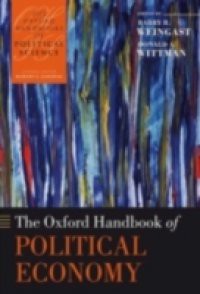Over its long lifetime, "political economy" has had many different meanings: the science of managing the resources of a nation so as to provide wealth to its inhabitants for Adam Smith; the study of how the ownership of the means of production influenced historical processes for Marx; the study of the inter-relationship between economics and politics for some twentieth-century commentators; and for others, a methodology emphasizing individual rationality (theeconomic or "public choice" approach) or institutional adaptation (the sociological version). This Handbook views political economy as a grand (if imperfect) synthesis of these various strands, treating political economy as the methodology of economics applied to the analysis of political behavior andinstitutions. This Handbook surveys the field of political economy, with 58 chapters ranging from micro to macro, national to international, institutional to behavioral, methodological to substantive. Chapters on social choice, constitutional theory, and public economics are set alongside ones on voters, parties and pressure groups, macroeconomics and politics, capitalism and democracy, and international political economy and international conflict.

